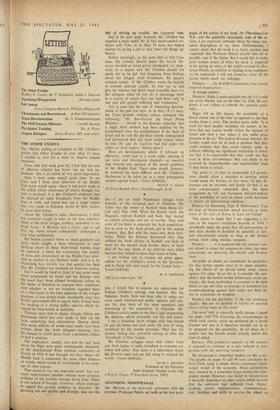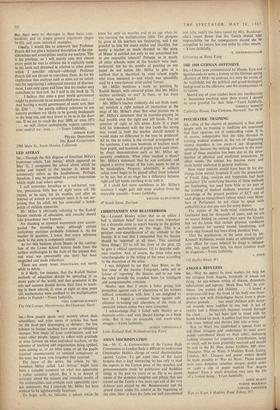AGONISING MISAPPRAISAL
SIR,—Because of my profound agreement with the premises Professor Peierls set forth in the first para-
graph of his review of my book, On Thermonuclear War, and the generally reasonable tone of his re- view, I am especially unhappy about his many mis- taken descriptions of my views. Unfortunately, I cannot claim that the book is so lucid, succinct and consistent that Professor Peierls should take all or possibl:' any of the blame. But I would like to make your readers aware of what my book is supposed to be saying on some of the points covered by Pro- lessor Peierls, in addition to making some comments on his comments. 1 will not, however, cover all the points which made me unhappy.
PEIERLS: . . . the RAND Corporation, that strange research organisation. . . .
A strange epithet!
PF.IERLS : Kahn is quite satisfied that the US would not strike Russia 'out of the blue' (p. 210). He evi- dently is not willing to concede the opposite possi- bility. . . .
Pages 191 to 205 discuss the possibility of a Soviet attack 'out of the blue' as opposed to one that results from a crisis. The section starts with: 'It is hard for most people, including the author, to be- lieve that any nation would violate the balance of terror and start a war unless it was under great
pressure to do so,' The section discusses whether the Soviets could ever be in such a position that they
could estimate that they could reliably strike us
without suffering any significant retaliation. It points out that it is conceivable that they could, but that even in these circumstances they are likely to be deterred by 'imponderables and uncertainties' even if they desire to attack.
The point is: (1) that no responsible US govern- ment should allow a situation to develop which would tempt the Soviets, or vice versa; (2) that de- terrence can be strained; and finally (3) that if we were conspicuously vulnerable then, 'the mere
recognition by US and European decision-makers of the possibility of such an attack could dominate or distort all international relations.'
PEIERLS (in discussing Type II Deterrence): Can the fear of thermonuclear attack prevent or limit crises of the type of Korea or Laos (or Cuba)?
This seems to imply that I am suggesting a re- turn to the massive retaliation doctrine of 1954. I specifically make the point that all provocations in that class should be handled by peaceful or lim- ited conventional actions as long as the Soviets refrain from using nuclear weapons.
PEIERLS . . . it is assumed that the attacker can- not afford to waste his weapons on cities. but must concentrate on attacking the missile and bomber bases. . . .
All kinds of attack are considered. In particular, the first lecture spends most of its space consider- ing the effects of an all-out (early sixty) attack against US cities. In so far as I consider the pos- sibility that the Soviets would deliberately avoid city attacks, the main motivation is assumed to be their desire to use our cities as hostages to intimidate our counter-attacking against their cities, not their de- sire to economise on weapons.
PEIERLS (on the possibility of the city avoidance attack): But are we justified in relying on rational choices being made at this point?
The word 'rely' is especially badly chosen. I spend ten pages (165-175) discussing the circumstances in which such attacks might be preferred by a Soviet planner and that it is therefore sensible for us to be prepared for the possibility. At no place do I predict that the Soviets would actually prefer, this kind of attack.
PEDALS : The productive capacity of the country is assumed to continue at a rate reduced in pro- portion with the surviving resources.
My discussion is somewhat unclear on this point. The graphs on pages 93 ana 94 were calculated by Paul Clark using a simple eleven component input-
output model of the economy. These calculations were checked by a somewhat larger twenty-one com-
ponent model. However, our belief in recuperation is basically dependent on other studies which showed that the survivors had sufficient food, shelter,
clothing. power, transportation, communication, fuel. fertiliser and skills to survive the attack so
that there were no shortages in these basic. com- modities; and on simple general arguments (pages 74-92); and some historical examples.
Finally, 1 would like to comment that Professor Peierls did not give a balanced description of the con- siderations and assumptions used in my analysis. This is his privilege, so I will merely note that almost every point he uses to criticise me is explicitly made in the book and discussed in relation to other points which I consider relevant—although Professor Peierls did not choose to reproduce them. As for his implication that analyses such as mine are no substi- tute for negotiating a substantial measure of disarma- • ment, I can only agree and hope that my studies may contribute to that end. As I said in the book (p. 7), `. . . I believe that even a poor world government might be preferable to an uncontrolled arms race.. ..' And barring a world government of some sort, then (p. 224) . . the purely military solutions to our security problem are likely to be grossly inadequate in the long run, and may prove to be so in the short run. If we are to reach the year 2000, or even 1975 . . we will almost undoubtedly require extensive arms control Inez -tires...: —Yours faithfully, HERMAN KAHN Physics Department The ,viand Corporation 1700 Main St., Santa Monica, California















































 Previous page
Previous page